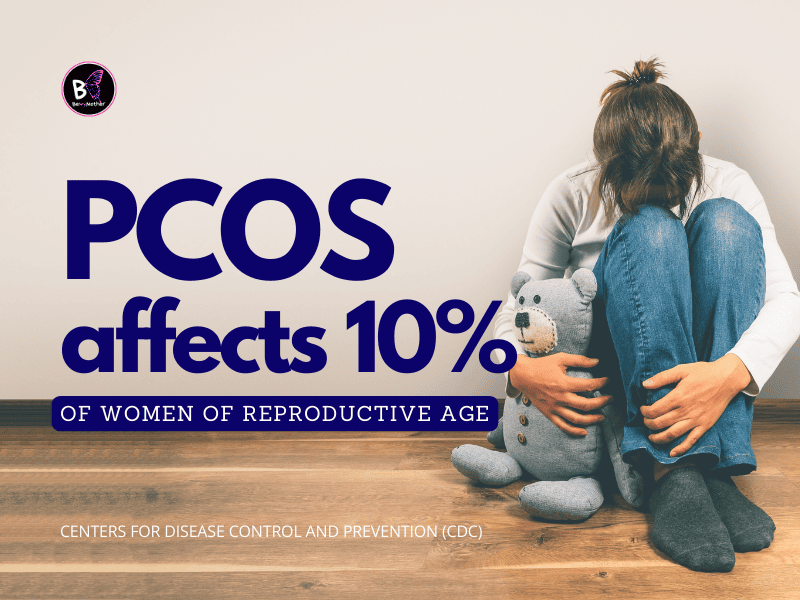Pregnancy is a cherished journey, but for women diagnosed with Polycystic Ovary Syndrome (PCOS), it can also bring unique challenges. PCOS, a hormonal disorder that affects ovulation and fertility as well, increases the risk of miscarriage and other complications.
Suppose you’re wondering how to avoid a miscarriage with PCOS. In that case, the good news is that proactive care, strategies, and medical guidance can significantly improve your chances of a healthy pregnancy. This guide will walk you through essential insights, from early diagnosis to actionable tips for reducing risks, all backed by research and expert advice.
1. Early Signs of PCOS and How to Prevent Pregnancy Complications

What Are the Symptoms of PCOS?
PCOS can often go undiagnosed until women encounter difficulties with conception. Common symptoms include:
- Irregular or missed periods.
- Difficulty conceiving due to irregular ovulation.
- Unexplained weight gain.
- Excess facial or body hair (hirsutism).
- Acne or oily skin.
- Thinning hair or hair loss.
Symptoms may vary in severity, so consulting a healthcare provider is key if you suspect PCOS.
How Is PCOS Diagnosed?
PCOS is diagnosed through:
- Blood Tests: To check for elevated androgen levels or insulin resistance.
- Ultrasounds: To detect ovarian cysts or enlarged ovaries.
- Medical History: A comprehensive review of symptoms and menstrual irregularities.
Why Early Diagnosis Matters
Early detection of PCOS can lead to better management of symptoms and reduced risks during pregnancy. By addressing the condition before conceiving, women can prevent complications like gestational diabetes and miscarriage.
Preventive Measures Before Pregnancy
- Lifestyle Changes: Incorporate a balanced diet and exercise to regulate insulin levels.
- Nutritional Supplements: Consider taking inositol, which research from Fertility and Sterility suggests can improve ovulation in women with PCOS.
- Medical Guidance: Use medications like metformin to stabilize blood sugar and hormone levels under professional supervision.
2. Understanding PCOS and Its Impact on Pregnancy
PCOS affects approximately 10% of women of reproductive age, and the statistics are attributable to the Centers for Disease Control and Prevention (CDC). It can cause:
- Hormonal Imbalances: Leading to irregular ovulation.
- Insulin Resistance: Increasing risks for gestational diabetes.
- Elevated Androgens: Affecting menstrual cycles and ovulation.
These factors can raise the chances of a miscarriage, which is why it is so important for women with PCOS to take extra care and seek proactive support.
Trying to track your ovulation and fertility more effectively? Discover how Can Inito Detect Pregnancy? might be the tool you need for this journey.
3. Does PCOS Increase the Risk of Miscarriage?
Yes, women with PCOS face a higher risk of miscarriage, particularly in the first trimester. Research from the National Institutes of Health (NIH) indicates that the miscarriage rate for women with PCOS ranges from 30–50%, compared to 10–15% in the general population.
Why This Happens
- Progesterone Deficiency: Low levels can affect uterine lining stability.
- Insulin Resistance: Disrupts hormonal balance, increasing risks.
- Chronic Inflammation: A hallmark of PCOS that complicates pregnancy outcomes.
4. How to Avoid a Miscarriage with PCOS: Key Strategies
Here are proven strategies to reduce miscarriage risks:
- Monitor Hormone Levels:
Regularly check progesterone and other key hormones during early pregnancy. - Manage Blood Sugar:
Use diet, exercise, or medications like metformin to maintain stable glucose levels. - Adopt a Balanced Diet:
Prioritize whole grains, lean proteins, and healthy fats while avoiding processed sugars. - Stay Active:
Engage in light to moderate activities like walking or prenatal yoga. - Regular Prenatal Care:
Work closely with your doctor to monitor fetal development and address risks proactively.
5. At What Week Do Miscarriages Commonly Happen with PCOS?
Miscarriages in women with PCOS most often occur in the first trimester (before 12 weeks). This is a critical time when hormonal imbalances, particularly low progesterone levels, can disrupt early pregnancy.
Prevention Tips:
- Start progesterone supplements early if recommended by your doctor.
- Limit strenuous activities and manage stress levels.
- Focus on proper nutrition and hydration.
6. The Role of Progesterone in Preventing Miscarriage with PCOS
Progesterone is crucial for maintaining a healthy pregnancy. It stabilizes the uterine lining and supports early fetal development.
A study in the American Journal of Obstetrics and Gynecology found that progesterone therapy significantly reduces the miscarriage rate in women with PCOS. Typical forms of supplementation include:
- Oral capsules.
- Vaginal suppositories.
- Injections.
7. How to Maintain a Healthy Pregnancy with PCOS
Can I get pregnant if I have PCOS?| Infertility Series | Dr Anjali Kumar | Maitri
Staying healthy with PCOS involves a multi-faceted approach.
| Aspect | Tips for Management |
| Diet | Include high-fiber, low-glycemic foods. |
| Exercise | Opt for low-impact activities like swimming. |
| Stress Relief | Practice mindfulness or yoga. |
| Sleep | Aim for 7–9 hours nightly. |
| Medical Monitoring | Regular prenatal checkups are essential. |
Wondering about pregnancy-safe skincare while managing PCOS? Read our guide on Bakuchiol Pregnancy Safe for gentle, practical solutions.
8. What Other Pregnancy Complications Should You Be Aware of with PCOS?
Women with PCOS are at a higher risk of:
- Gestational Diabetes: Due to insulin resistance.
- Preeclampsia: High blood pressure during pregnancy.
- Preterm Labor: Delivering before 37 weeks.
Work with your doctor to create a care plan that includes regular screenings for these complications.

FAQ: Common Questions About Avoiding Miscarriage with PCOS
1. Can women with PCOS have healthy pregnancies?
Yes, with the right medical support and lifestyle changes, many women with PCOS go on to have healthy pregnancies and babies.
2. Does PCOS mean I will have a miscarriage?
No, while PCOS increases the risk, proactive measures like hormone monitoring and a healthy lifestyle significantly reduce the likelihood.
3. How does metformin help with PCOS during pregnancy?
Metformin improves insulin sensitivity, regulates hormones, and may lower miscarriage risks for women with PCOS.
4. Are there early signs of miscarriage I should watch for?
Heavy bleeding, severe cramping, or passing tissue are signs that should be reported to your doctor immediately.
5. Can lifestyle changes reduce miscarriage risks with PCOS?
Absolutely. A balanced diet, regular exercise, and stress management play a significant role in reducing risks.
Conclusion
Pregnancy with PCOS may come with unique challenges, but it is entirely possible to have a healthy and fulfilling journey with the proper support. By recognizing the symptoms early, working closely with your healthcare provider, and making proactive lifestyle changes, you can minimize risks and focus on the joy of bringing a new life into the world.
Let’s make this journey smoother together. Check out our related articles for more tips on managing your pregnancy with confidence and care.



